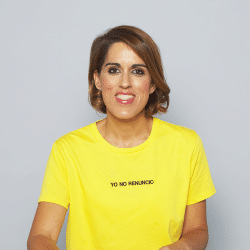Introduction
Graciela is creating the conditions to ensure that young people are equipped with the skills needed to create positive change, broadening the purpose of education from technical training to using this knowledge for social good. Movimiento STEM engages the full spectrum of stakeholders to embed this vision throughout the ecosystem and provides the capacity to act collectively towards it.
The New Idea
Graciela is shifting the focus of education towards empowering new generations of active citizens and changemakers. Through her organization, Movimiento STEM, she has become the catalyst and convener of a multi-sector network that is committed to this shared purpose. She has set up support structures to improve the flow of knowledge, resources, and best practices across sectors, while building each actor’s capacity to fulfil their new role. By engaging people at all levels – from students and teachers to policymakers and businesses – Graciela is setting a new vision for the system to ensure that efforts to improve education look beyond employability.
For this, Graciela is building upon the growing STEM movement to foster abilities such as critical thinking, problem solving, creativity, and teamwork that are essential to solve urgent social issues. For many who are seeking to improve opportunities for youth amid a changing economic and social landscape, STEM has provided the framework and vocabulary to guide their efforts. However, Graciela realized that the value of STEM has been reduced to providing technical skills for the new economy. This narrow understanding is a missed opportunity to nurture leaders who can use these skills to contribute to the wellbeing of people and planet. It can even do more harm than good: studies have shown that teaching STEM from a solely technical standpoint can be detrimental to the development of socioemotional qualities like empathy. To move away from this approach, Graciela is rallying stakeholders to redefine the “why” behind promoting STEM education and help them see their role in a new light.
Beyond encouraging them to embrace the new purpose, Graciela has created avenues to enable coordination and collaboration across the system. Through an open-access training platform, knowledge sharing, and a national prize to recognize role models, teachers have the resources and abilities to implement more impactful methods in class that encourage changemaking. Graciela uses evidence-based standards, a certification system, and indicators to set the bar for quality in education programs and measure progress. At the other end, students can access mentorship and training opportunities with STEM professionals to smooth the transition from school to employment, and those who are already making changes in their communities are spotlighted in storytelling campaigns to inspire others. These programs are made possible by connecting public institutions, businesses in STEM fields, academia, and civil society organizations with schools and students as well as with each other. These organizations not only provide resources and know-how, but also receive guidance to integrate social impact and inclusion into their internal practices.
Movimiento STEM has rapidly grown into a cross-sector bloc with enough leverage to influence policies. Graciela convened all key players to define the strategic priorities for improving education at the national level and the actions needed to achieve them. This effort culminated in the National Strategy for STEAM Education, a policy proposal that will serve as a blueprint to reform education in Mexico and abroad. Based on this success, Graciela is now working to spread her movement to four other Latin American countries by transferring her model to local non-profits. Graciela envisions a future in which the gap in access to quality education is significantly reduced, and teaching that prioritizes innovation, social impact, and collaborative problem solving becomes the norm.
The Problem
In Mexico, a stagnant education system is leaving youth unprepared to face today’s increasingly complex challenges. Outdated teaching methods, poor teacher training, and insufficient resources mean that most students leave school without critical technical and socio-emotional skills. In 2018, for instance, more than half of Mexican primary students failed to meet OECD standards when tested in basic skills like reading, mathematics, science, and collaborative problem solving. At one level, these limitations exclude youth from opportunities in a changing economic landscape. This need has long been highlighted by international organizations, think tanks, and governments across the world. For Graciela, however, a deeper concern is that children and youth lose the capacity to question problems, create innovative solutions, and put them into action. The current system is failing to cultivate the changemakers needed to address pressing issues today and in the future.
Without inspiring teaching nor clear opportunities after graduation, students have little incentive to engage meaningfully with their studies. The Observatory of Educational Innovation, a Mexican think tank, has found that education is mostly perceived as a requirement to fulfill, not as a useful pathway to unleash youth’s potential. As a result, drop-out rates are high; the OECD estimates that 65% of Mexican adults who are over 25 years old never completed their upper secondary education. The gap in access to quality education is therefore widening inequalities among youth.
Promises to overcome these challenges via educational reforms have been politicized and fallen short. According to the World Bank, public spending on education has been fluctuating significantly in the past ten years, often leaving budgets for textbooks and teacher trainings to be slashed by 40% in a single year. Meanwhile, existing standards and regulations are not evenly enforced. The Journal of Education for Teaching found that innovative practices have only been introduced to individual schools, often by isolated efforts from non-profits. A massive effort to transform education has yet to materialize.
The lack of coordinated action has also meant that resources are not allocated efficiently across the system. Businesses that are facing a talent gap do not have long term strategies to support the education community in providing these skills. At the same time, the education community has inadequate resources and know-how to shift away from the outdated approach. For instance, public school teachers are under-trained and rarely evaluated; the latest official data from 2012 shows that 70% of public-school professors failed a standardized teaching exam. More recently, the Wilson Center found that one in every four teachers report feeling unprepared to fulfil their work. Without the right tools, teachers’ potential to spearhead change is squandered.
The Strategy
Aware that she needs all players on board to overhaul this system, Graciela is creating ways to bring the government, companies, schools, and citizen sector organizations to work together. Graciela’s Movimiento STEM helps each actor to understand the role they can play, provides them with the incentives they need to get involved, and weaves connections across the network. She trains education providers to embed STEM skills and a focus on social impact across the curriculum and provides partnerships and resources to facilitate implementation. Currently Graciela is working with 120 partners and a network of 10,000 teachers in Mexico to spread this new approach to teaching and shape public policies. Using a social franchising model, she is starting to grow her movement to four more countries in Latin America.
To build the demand for STEM education with a social vision, Movimiento STEM facilitates media collaborations between players that together can reach millions throughout the country. The network’s awareness-raising campaigns and events have reached a combined audience of nine million people, helping to spread a new narrative about education. In one recent case, Movimiento STEM catalyzed a partnership between YouTube, the National Ministry of Education, and an educational TV network that led to a joint national media campaign to bring visibility to “STEM Heroes”: leaders with inspiring stories that encourage children and youth to learn more about these fields.
Once the interest has been generated, Movimiento STEM uses certification to create incentives for engagement, align all partners with its vision, and ensure quality standards. Graciela uses the talent gap as an entry point to involve businesses in supporting the new approach to STEM. Businesses that invest in promoting STEM education and talent with a focus on social impact can be recognized as a Committed Company, a badge that helps earn support from consumers and unlocks access to a network of peers to share best practices. After assessing their entire operations, Movimiento STEM helps businesses identify opportunities for using existing resources to support change, such as investing in education programs, mentoring students, establishing public-private partnerships, and changing internal practices. In 2019, Movimiento STEM created an alliance between major business guilds and chambers of commerce, including the Mexican Business Coordinating Council (CCE) and the American Chamber, among others, to coordinate the business sector’s role in promoting STEM education. The alliance has already published a national steering document, launched a public-private certification in STEM skills for youth out of formal education, and developed a CSR program to bring STEM training to vulnerable communities.
Meanwhile, certified education institutions and extra-curricular providers can benefit from increased trust from potential funders, partners, and students. Several colleges have included a gender perspective in their engineering curricula to earn the accreditation. Additionally, certified organizations receive opportunities for capacity-building and visibility and can connect with each other to share best practices. Certification is helping to homogenize standards across programs, while sharing resources across Movimiento STEM’s network levels the playing field for organizations in underserved areas to ensure that young people anywhere can access quality education.
At a more direct level, teachers who train with Movimiento STEM can apply for a certificate that is recognized by the Ministry of Education. These teacher trainings use a new framework that shows how to foster skills like critical thinking, creative problem solving, and creativity in any subject (not just STEM), and how to drive students to apply them to create change in their communities. Teachers come away with a new understanding of the importance of their work in unleashing social innovation. So far, Movimiento STEM has trained over 10,000 middle-and-high-school teachers, 80% of whom work in public schools. Teachers who complete the certification have access to lesson plans and resources that can be adapted to any context and education level. All materials include a gender perspective throughout. Those who need it receive tailored recommendations for improvement and additional training. Training is implemented through workshops and the resources are made publicly available through an online platform. Over 100,000 students across Mexico have completed the training independently, 70% from public schools or vulnerable socio-economic backgrounds.
Movimiento STEM also looks to highlight, propel, and connect leaders who are already making a difference within the educational field so they can increase their impact and inspire others. The organization created a national prize for teachers, women, and students who are generating positive change in their communities using STEM skills. The winner of the 2020 edition of the National Teacher Prize, for example, has transformed dry textbook material into a theoretical base for her students to develop real-life projects to reduce plastic waste in their community. Sponsored by corporate partners and carried out in collaboration with the National Ministry of Education, the National Teacher Prize 2020 received 3,000 candidacies from all over Mexico. Finalists are eligible to win a million-peso cash prize to improve education in their schools or communities; they also gain access to events and an online learning forum where they can share lesson plans, exchange ideas, and receive advice from peers.
At the same time, Graciela understands that reducing the gap between education and opportunity also requires smoothing the transition towards professional life. To help young people make informed choices and dismantle gender stereotypes around STEM, Graciela is making free vocational guidance an essential component of the education system. Movimiento STEM offers free vocational guidance sessions online in partnership with STEM professionals and businesses. In 3 years, 10,000 high-school students have used with these services, 26% of whom are girls that shifted their aspirations and decided to pursue an engineering major in college. Graciela has also introduced a proposal to Mexico’s Congress to make vocational guidance mandatory and structured with a gender perspective. Moreover, her organization is planning to launch a platform that will use employment databases to link employers and potential employees with a unique twist – youth without specific skills required to fill jobs will be able to access courses to develop them.
Graciela is now aiming to institutionalize her approach to teaching and learning into national policy. The breadth of her network has allowed her to articulate a bloc with enough influence and buy-in to do so, including partners as diverse as Cemex, Bayer, the National Ministry of Education, the National STEM Council, and leading universities, among others. In a massive undertaking spearheaded by Graciela, this network recently came together to draft a National Education Strategy for Mexico. The document will serve as a roadmap for planning, implementing, and monitoring STEM policies and programs over the next decade, and seeks to become a benchmark for other countries in Latin America. Graciela collaborated with universities, Google, Lego Education, Mexico’s State Department, and the Inter-American Development Bank to define 30 indicators that will be measured periodically to rigorously evaluate progress against the National Strategy’s targets. This report will be presented at the 2021 G20 Summit in Rome to inform other countries’ education strategies. Likewise, in 2021 Graciela’s organization presented a proposal at one of Mexico’s Congressional Committees with a concrete blueprint to reduce the gender gap in STEM. Cross-sector research will continue to be a core pillar of Graciela’s strategy to support policy formulation and decision-making across the system and foster a culture of impact measurement.
A talented mobilizer, Graciela started building the network in 2019 with 41 allies – as of 2021, 120 actors have joined the movement. In the next five years, Graciela plans to grow the network to other Latin American countries. By relying on local partners to give her a specialized overview of the precise challenges of each nation and by carefully assessing the status of skills-based and inclusive education in every place, she has carefully crafted a replication model. Starting with Colombia, Argentina, Chile, and Peru, Graciela is transferring her methodology to local non-profits that already operate within educational fields. In this way, Graciela will be able to share reliable and standardized yet adaptable know-how that can be used to build the movement locally.
The Person
Growing up, Graciela dreamed of becoming a teacher. Her father and brothers were engineers, but a career in those fields seemed out of reach as a girl. She was an excellent student in science and math yet everyone around her regarded these fields as “masculine”. The idea of following in her father’s footsteps like her brothers did not even occur to her. Graciela’s passion for learning carried on into her teenage years, even though her ambitions changed. When a financial crisis hit her family, her father delivered the devastating news that Graciela would not be able to attend university. Her parents believed that pursuing higher education was unnecessary for a woman. Undeterred, Graciela decided to teach English to finance her studies.
Graciela went on to have a successful 12-year career in marketing; however, she was missing a sense of fulfillment. Graciela quit her job and, recalling her childhood dream, started training to become a Montessori guide. But something was still missing. She suddenly realized that she could combine her marketing expertise with her long-lasting passion for education to make a unique contribution to the field. Researching into Mexico’s education system, she noticed that the focus on rote learning was sucking the mystery and excitement out of science. Kids not only disliked the subjects, but they were also missing out on developing crucial skills like curiosity, creativity, and problem solving. To change this, Graciela launched Profesor Chiflado, an initiative to offer children opportunities to learn and love science through play. Underlying the project was the conviction that scientific education can be a powerful tool to enable students to understand the causes of problems and how to change them. Profesor Chiflado became a national triumph that has reached two million girls and boys every year.
Ten years later, Graciela was named Entrepreneur of the Year by Mexico’s federal government. Yet this milestone led Graciela to reflect that, although meaningful, her work with Profesor Chiflado was not creating systemic change. As she assessed the challenge from the lens that defined Profesor Chiflado – how science nurtures skills that can unleash youth’s potential to create change in any setting – she came to a crucial conclusion. Promoting STEM education could change how children were learning and open up more opportunities. For Graciela, the STEM approach was valuable for its ability to emphasize skills-based learning, but it needed a greater emphasis on social impact. Often too technical and inaccessible to most students, STEM learning practices could only be seen as a piece of a greater puzzle.
A master articulator, Graciela quickly developed a multi-level strategy to materialize innovative and inclusive change in the education system. She embarked on a mission to help decisionmakers at local, national and regional levels empower kids with the skills and support needed to become changemakers, launching Movimiento STEM in 2017. Since then, her efforts have been recognized by multiple publications and organizations like Forbes, which included Graciela in its list of Mexico’s most powerful women, and Globant, which granted her its Changemaker Award in 2020. She was also named among the 100 women leaders in STEM by Peak Performance with Patience. Movimiento STEM has been a "Leadership in Tech" finalist for the Equals for Tech Award 2019 in the category of “Leadership in Tech”, received the 2020 Champions Award at the Information Society World Summit 2020, and was a finalist for the Ganar-Ganar Award 2020 in the category of Social Responsibility.




